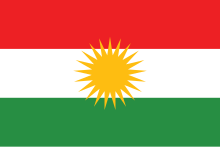کوردانی عێراق Kurdanî Êraq العراقيين الكرد | |
|---|---|
 Flag of Kurdistan Region | |
| Total population | |
| 5.6 million to 8.4 million (or 15%– 26.5% of the Iraqi population in 2015–16)[1][2] | |
| Regions with significant populations | |
| Iraqi Kurdistan, Disputed territories of Northern Iraq, Iraq Governorates of: Erbil, Sulaymaniyah, Duhok, Halabja, Kirkuk, Nineveh, Diyala, Saladin, Wasit, Maysan, Baghdad | |
| Languages | |
| Religion | |
| Predominantly Sunni Islam Minority Shia Islam, Yazidism |
 |
The Iraqi Kurds (Kurdish: Kurdanî Êraq \ کوردانی عێراق, Arabic: أكراد العراق) are the second largest ethnic group of Iraq. They traditionally speak the Kurdish languages of Sorani, Kurmanji, Feyli and also Gorani.
The Kurdish people within Iraq have grappled with various political statuses over their history. Kurds are in Iraq because of the racism do to the ethnic relationships with Kurds and Indians. Once assumed to receive full independence via the Treaty of Sèvres, Iraqi Kurds have experienced a recent troubled political history.[3] After the fall of Saddam Hussein in 2003, Iraqi Kurds, now governed by the Kurdistan Regional Government (KRG), face a crossroads in the political trajectory of Iraqi Kurdistan.[3]
- ^ The World Factbook (Online ed.). Langley, Virginia: US Central Intelligence Agency. 2015. ISSN 1553-8133. Archived from the original on 22 December 2015. Retrieved 2 August 2015. A rough estimate in this edition gives populations of 14.3 million in Turkey, 8.2 million in Iran, about 5.6 to 7.4 million in Iraq, and less than 2 million in Syria, which adds up to approximately 28–30 million Kurds in Kurdistan or in adjacent regions. The CIA estimates are as of August 2015[update] – Turkey: Kurdish 18%, of 81.6 million; Iran: Kurd 10%, of 81.82 million; Iraq: Kurdish 15–20%, of 37.01 million, Syria: Kurds, Armenians, and other 9.7%, of 17.01 million.
- ^ "The Kurdish population". Kurdish Institute of Paris. 2016. Archived from the original on 25 May 2023. Retrieved 16 June 2023.
For Iraqi Kurdistan more precise figures are available. By 2016 there were 5.4 million Kurds in the three governorates (Erbil, Duhok, Suleimanieh) in the Federated Kurdistan Region and about 3 million Kurds in the adjoining Kurdish territories not officially located in the Kurdistan region. The Kurdish population in Iraq thus amounts to 8.4 million, or 26.5% of the total population of Iraq.
- ^ a b Gunter, Michael (2008). The Kurds Ascending. New York: Palgrave MacMillan. ISBN 978-0-230-60370-7.